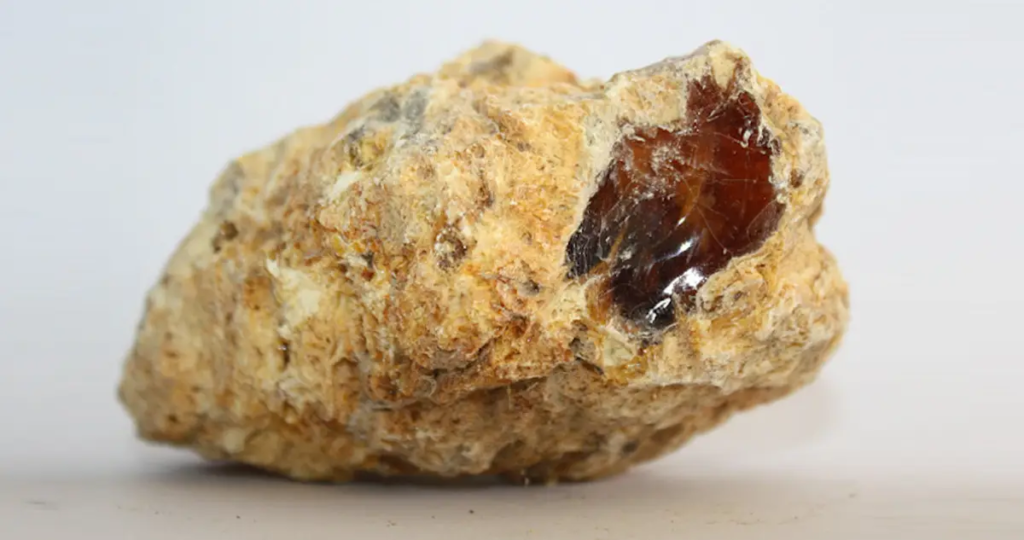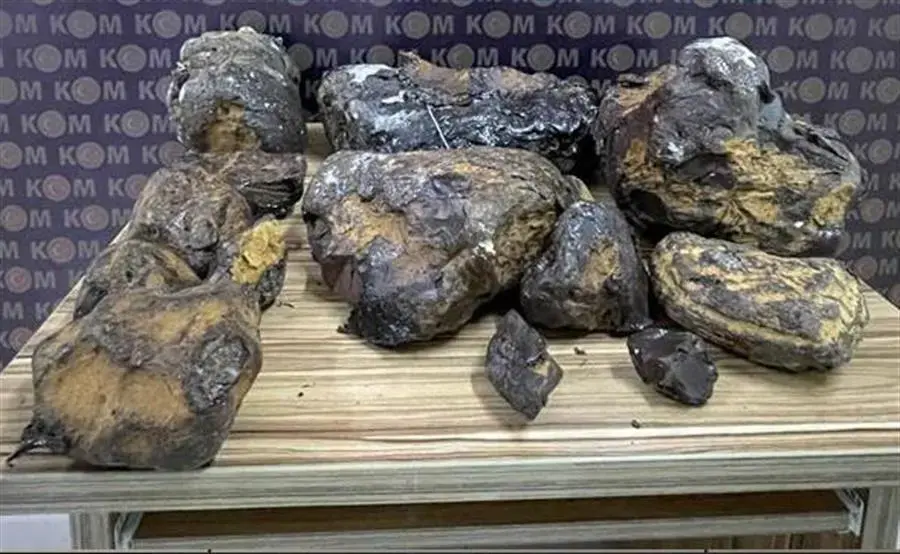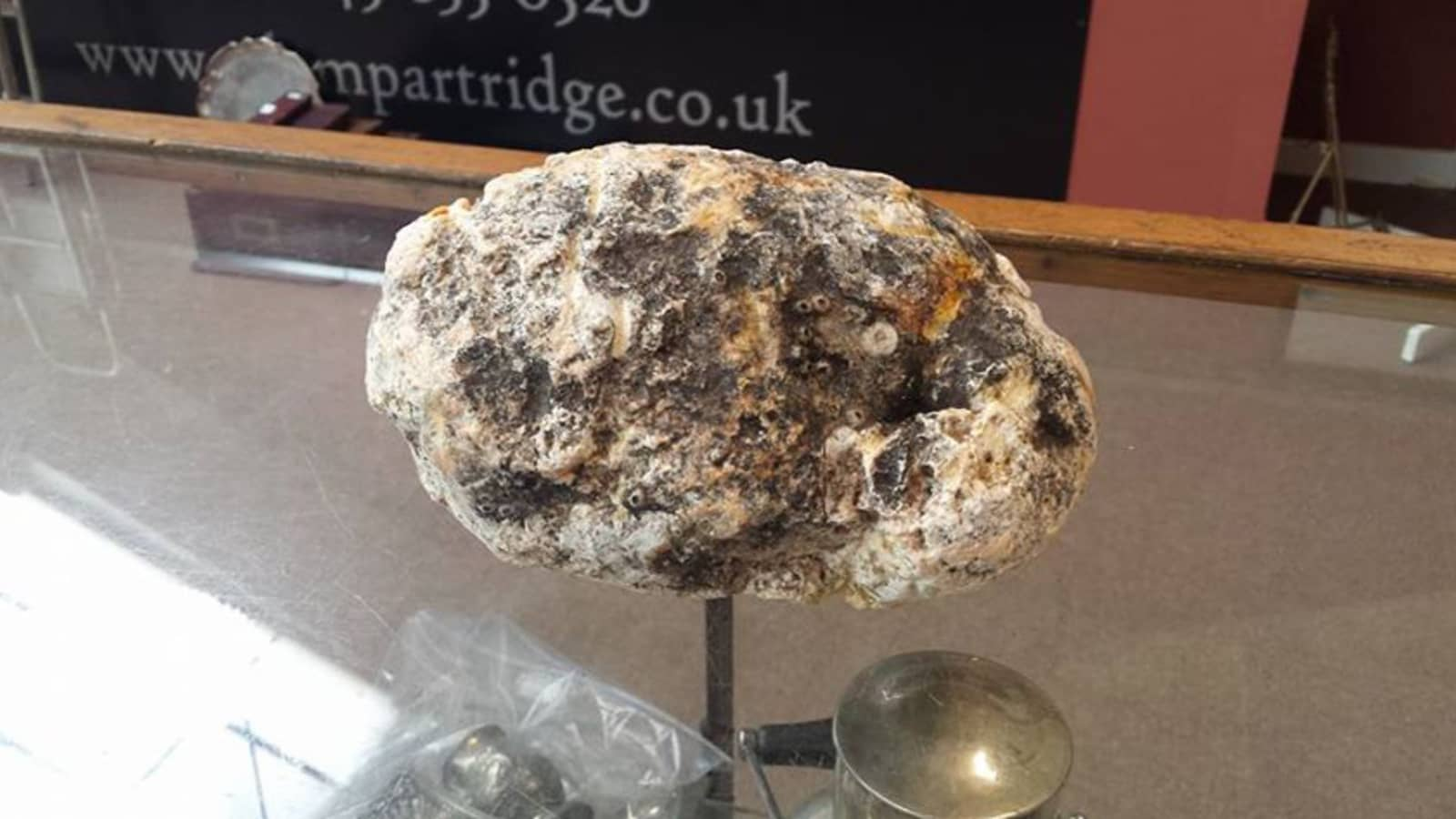Whale vomit, scientifically known as ambergris, is one of the most valuable natural substances in the world. Recently, the Thane police made a major breakthrough by seizing 5.6 kg of whale vomit worth a staggering ₹ 6.20 crore.
The three smugglers involved in the illegal trade were apprehended, marking a significant victory in the fight against the smuggling of this rare substance. Ambergris, or whale vomit, has long been coveted for its unique properties, making it a sought-after material in various industries.
The crime branch in Kalyan, Maharashtra, received intelligence that led them to take swift action against the smugglers. The accused, identified as Anil Bhosale, Ankush Shankar Mali, and Laxman Shankar Patil, were attempting to transport the ambergris from Pipeline Road to Badlapur in a car.
Read : Rare Sea Animal Arnoux’s Beaked Whales Known for Hour-Long Dives Spotted in Antarctica
Acting on this information, the Thane police set up a search operation, which resulted in the successful arrest of the suspects and the recovery of the whale vomit. This incident highlights the ongoing illegal trade in ambergris, a practice that has been steadily increasing due to the high demand for this rare substance.
The Value of Ambergris or Whale Vomit
Ambergris, often referred to as whale vomit, is a rare and valuable substance that is formed in the digestive system of sperm whales. Despite its unappealing nickname, ambergris is highly prized for its use in the perfume industry.
Read : Ageless Wonders: Earth’s Longest Living Species and the Science Behind Their Longevity
The substance is produced when whales digest certain types of food, such as squid. It is then excreted or regurgitated by the whale, often floating on the ocean’s surface for years before washing ashore. Over time, the ambergris hardens and develops a unique, pleasant odor, which is why it is used as a fixative in high-end perfumes.
The rarity of ambergris is what makes it so valuable. It is extremely difficult to find, as it is only produced by sperm whales and is rarely found in large quantities. This scarcity drives up the price, making it a target for smugglers and illegal traders.

In recent years, the demand for ambergris has increased significantly, leading to a rise in poaching and illegal trafficking. Whale vomit has been known to fetch millions of dollars on the black market, and the Thane police seizure of 5.6 kg worth ₹ 6.20 crore demonstrates just how valuable this substance is.
The Smuggling of Whale Vomit
The illegal trade of whale vomit has become a serious concern for law enforcement agencies around the world. Ambergris is considered a protected substance in many countries, including India, due to the fact that sperm whales are an endangered species.
The sale and possession of ambergris are prohibited under the Wildlife Protection Act of 1972 in India. Despite these legal restrictions, the high value of whale vomit makes it an attractive target for smugglers.
In the case of the Thane police operation, the smugglers were attempting to transport the ambergris to Badlapur, a town in Maharashtra. It is likely that the substance was destined for sale in the black market, where it could fetch millions of rupees from buyers in the perfume industry.
Fortunately, the timely intervention of the crime branch in Kalyan prevented the sale and distribution of the whale vomit. This seizure serves as a reminder of the importance of vigilance in the fight against wildlife trafficking.
The smugglers, identified as Anil Bhosale, Ankush Shankar Mali, and Laxman Shankar Patil, are now in police custody, and further investigations are underway to determine the extent of their involvement in the ambergris smuggling network.

The arrest of these individuals is a significant achievement for the Thane police, but it also underscores the growing issue of illegal wildlife trade in the region. Ambergris smuggling is not an isolated incident; it is part of a larger global network of wildlife traffickers who exploit endangered species for profit.
The Environmental and Legal Implications of Ambergris Trade
The trade of whale vomit, or ambergris, has serious environmental and legal implications. Sperm whales are a protected species under international law, and the harvesting of ambergris from these animals is strictly prohibited in many countries.
In India, the Wildlife Protection Act of 1972 categorizes sperm whales as endangered, and the collection, sale, or possession of ambergris is illegal. The enforcement of these laws is critical to preserving sperm whale populations and protecting marine ecosystems.
Ambergris plays a vital role in the whale’s digestive system, and the removal of this substance can have harmful effects on the animal’s health. Moreover, the illegal trade of ambergris incentivizes the hunting and exploitation of sperm whales, further endangering their already vulnerable population.
By seizing whale vomit and arresting smugglers, law enforcement agencies like the Thane police help to disrupt the illegal trade and protect endangered species from exploitation.
In addition to the environmental impact, the smuggling of ambergris has significant legal consequences. Those caught engaging in the illegal trade of whale vomit face severe penalties, including fines and imprisonment.
In the case of the Thane police operation, the three arrested smugglers are likely to face charges under the Wildlife Protection Act, which could result in lengthy prison sentences. The strict enforcement of wildlife protection laws is essential in deterring smugglers and preventing the illegal trade of protected substances like ambergris.

The Global Market for Whale Vomit
Despite the legal restrictions, the global market for whale vomit continues to thrive, driven by the high demand for ambergris in the perfume industry.
Ambergris is prized for its unique ability to enhance the longevity of scents, making it a valuable ingredient in luxury perfumes. Some of the world’s most famous perfume brands have historically used ambergris in their formulations, adding to its allure and mystique.
The value of ambergris fluctuates depending on its quality, age, and rarity. Fresh ambergris has a strong, unpleasant odor, but as it ages, it develops a sweet, earthy scent that is highly sought after by perfumers.
The rarity of aged ambergris contributes to its high market value, with prices reaching as much as $20,000 per kilogram in some cases. This lucrative market has led to the rise of ambergris smugglers, who risk legal repercussions in pursuit of the high profits associated with whale vomit.
The seizure of whale vomit worth ₹ 6.20 crore by the Thane police is a significant victory in the ongoing fight against illegal wildlife trade. Ambergris, or whale vomit, is a rare and valuable substance that has been exploited by smugglers due to its high demand in the perfume industry.
The successful apprehension of the three smugglers involved in this case highlights the importance of law enforcement efforts in combating wildlife trafficking and protecting endangered species like sperm whales.
As the investigation into this case continues, it serves as a reminder of the critical need for vigilance in preventing the illegal trade of ambergris.
The environmental and legal implications of this trade cannot be overstated, and the protection of sperm whales and their habitats is essential for maintaining marine biodiversity. By enforcing strict wildlife protection laws and disrupting smuggling networks, authorities can help preserve these majestic creatures for future generations.

